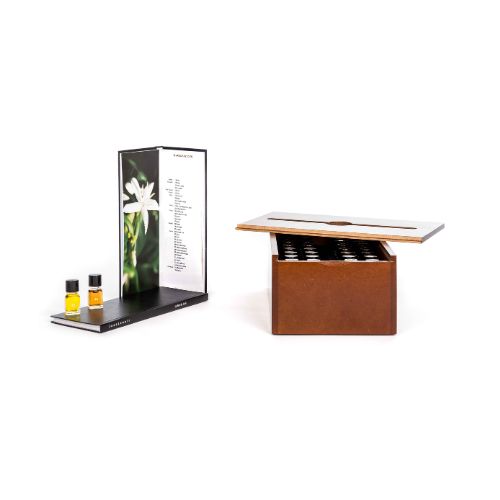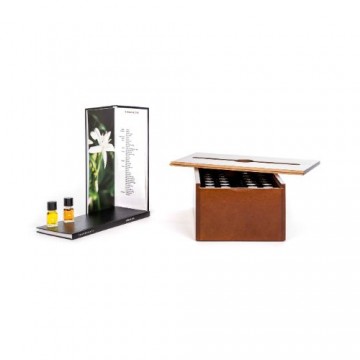Le Nez du Café Revelation 36 aromas (Special)
-
S$47988

Le Nez du Café Revelation contains:
- 36 aromas for you to smell and memorize:
Earthy note: 1 earth. Vegetables notes: 2 potato, 3 garden peas, 4 cucumber. Dry/vegetal note: 5 straw. Woody note: 6 cedar. Spicy notes: 7 clove-like, 8 pepper, 9 coriander seeds, 10 vanilla. Floral notes: 11 tea-rose/redcurrant jelly, 12 coffee blossom, 13 coffee pulp. Fruity notes: 14 blackcurrant-like, 15 lemon, 16 apricot, 17 apple. Animal notes: 18 butter, 19 honeyed, 20 leather. Toasty notes: 21 basmati rice, 22 toast, 23 malt, 24 liquorice, 25 caramel, 26 dark chocolate, 27 roasted almonds, 28 roasted peanuts, 29 roasted hazelnuts, 30 walnuts, 31 cooked beef, 32 smoky note, 33 pipe tobacco, 34 roasted coffee. Chemical notes: 35 medicinal, 36 rubber.
- An illustrated book describes the aromatic group of each aroma, its odoriferous features and its presence in the world’s coffees, as well as the art of coffee growing, roasting and brewing.
It enables you to:
1. Train and enrich your olfactory memory…
The sense of smell constitutes the most important sense in the perception of a coffee. But it is often difficult to identify an aroma in your coffee cup. Have you already encountered the feeling that you know a smell without being able to recognize it? Nothing is more normal! In the same way that we learned to read, write, or count, smelling also requires training.
2. …to better analyze the coffee that you taste
But “What use is that?” First of all, recognizing aromas enriches your tasting vocabulary. Being able to attach a word to your impressions increases your tasting pleasure and allows you to share your ideas with others. Then, the aromas of coffee inform us about its varietal and geographic origin and the different steps in its creation, from the methods of cultivation through the roasting of the beans to the techniques of preparation.
Le Nez du Café Revelation contains:
- 36 aromas for you to smell and memorize:
Earthy note: 1 earth. Vegetables notes: 2 potato, 3 garden peas, 4 cucumber. Dry/vegetal note: 5 straw. Woody note: 6 cedar. Spicy notes: 7 clove-like, 8 pepper, 9 coriander seeds, 10 vanilla. Floral notes: 11 tea-rose/redcurrant jelly, 12 coffee blossom, 13 coffee pulp. Fruity notes: 14 blackcurrant-like, 15 lemon, 16 apricot, 17 apple. Animal notes: 18 butter, 19 honeyed, 20 leather. Toasty notes: 21 basmati rice, 22 toast, 23 malt, 24 liquorice, 25 caramel, 26 dark chocolate, 27 roasted almonds, 28 roasted peanuts, 29 roasted hazelnuts, 30 walnuts, 31 cooked beef, 32 smoky note, 33 pipe tobacco, 34 roasted coffee. Chemical notes: 35 medicinal, 36 rubber.
- An illustrated book describes the aromatic group of each aroma, its odoriferous features and its presence in the world’s coffees, as well as the art of coffee growing, roasting and brewing.
It enables you to:
1. Train and enrich your olfactory memory…
The sense of smell constitutes the most important sense in the perception of a coffee. But it is often difficult to identify an aroma in your coffee cup. Have you already encountered the feeling that you know a smell without being able to recognize it? Nothing is more normal! In the same way that we learned to read, write, or count, smelling also requires training.
2. …to better analyze the coffee that you taste
But “What use is that?” First of all, recognizing aromas enriches your tasting vocabulary. Being able to attach a word to your impressions increases your tasting pleasure and allows you to share your ideas with others. Then, the aromas of coffee inform us about its varietal and geographic origin and the different steps in its creation, from the methods of cultivation through the roasting of the beans to the techniques of preparation.













